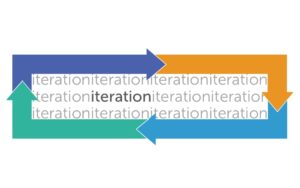RESOURCES
Big Idea: Iteration
Mar 2, 2019
 Originating as a term in mathematics and computer science the concept of iteration has moved into design and learning. Iteration is at the heart of Challenge Based Learning (CBL). From identifying and refining big ideas and challenges to building and testing solutions, the investigation cycle repeats to improve the results. This challenge focuses on the process of iteration, combines it with CBL and directs it at improving an idea or process to make a positive impact on a community. Learning to refine actions to reach the desired result is an essential skill for the CBL process and life.
Originating as a term in mathematics and computer science the concept of iteration has moved into design and learning. Iteration is at the heart of Challenge Based Learning (CBL). From identifying and refining big ideas and challenges to building and testing solutions, the investigation cycle repeats to improve the results. This challenge focuses on the process of iteration, combines it with CBL and directs it at improving an idea or process to make a positive impact on a community. Learning to refine actions to reach the desired result is an essential skill for the CBL process and life.
Look around, talk with community members and identify something that can be improved. Ask questions, investigate, synthesize, prototype and iterate.
ENGAGE
Big Idea: Iteration
Essential Question: How can we use iteration to improve existing ideas and processes to make life better
Challenge: Iterate on an existing idea or process to measurably improve your community
Sample Guiding Questions
These are only example questions we encourage you to ask as many personal and contextual questions as possible.
- What is iteration?
- What is the origin of the idea of iteration?
- How does iteration work?
- What else is necessary for the iterative cycle?
- How can we use iteration to make ideas better?
- What is the role of reflection in an iterative process?
- What is the role of questions in an iterative process?
- Is iteration always positive?
- What is the relationship between iteration and failure?
- What does iteration look like in sports, music and other activities?
- What are things that could work better in my school or community?
- Etc.
*Once you brainstorm all of the questions organize and prioritize them.
INVESTIGATE
Guiding Activities and Resources
These are only a set of example activities and resources and the learners will need to evaluate the quality of the content. They are not verified or necessarily supported, just examples. The ones that you choose should be in direct relationship to your specific guiding questions and context. Activities and resources for adults, adolescents, and younger children will be different. The goal is to develop solutions that mean something in your community and are sustainable.
Example Activities
- Investigate the origin of iteration in computer science
- Find examples of products that have been improved through iteration
- read local newspapers and tour the community
- Identify things that do not work well in your school and community.
- observe them
- talk with the people involved
- ask lots of guiding questions
- look for trends
- Develop prototypes and test them
- Measure the results
- Reflect
- Learn
- Make adjustments and build a new prototype
- Repeat
Example Resources
- Iterate – New York Times Magazine
Iteration is not the same as design
Synthesis
Using the research findings from your Investigations develop a synthesis that demonstrates a clear understanding of the challenge
Solution Prototypes – Using your research synthesis create multiple ideas for solutions and review each one to make sure your research supports it. Share the prototypes with various stakeholders and get feedback.
Solution – with the feedback from the stakeholders develop one solution that has the most potential for success.
ACT
Implement – Develop a plan to implement the solution with the stakeholders and collect data about the impact.
Evaluate – Using quantitative and qualitative measures determine if the solution is valid and what can be improved.
REFLECT, DOCUMENT, AND SHARE
Throughout the experience take time to document the events and reflect on what is happening to build on prior knowledge and identify future questions.
Share what you learned with your local community and the world. Use #CBLWorld on social media.
